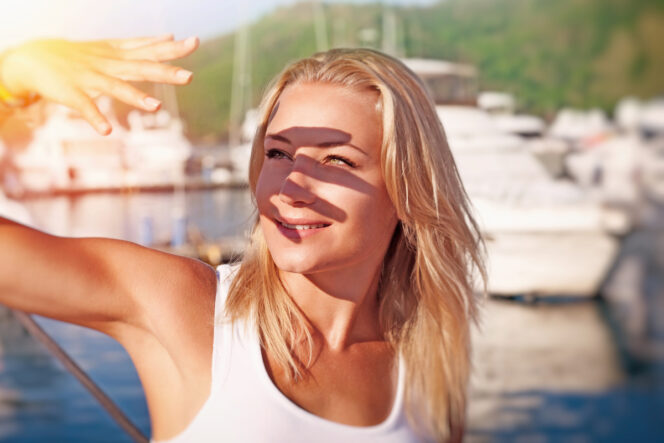The sun can damage your eyes, even if you don’t realize it. Fortunately, not all sun-related eye conditions are permanent.
Technically, your corneas are prone to sun damage through a condition called photokeratitis. If you found any vision issue you can try medication. TheyaVue Buy Online.
It is also known as welder’s flash, snow blindness and arc eye, although you do not need to be welding or near snow to obtain it.
Here are some other eye conditions that can result from ultraviolet (UV) exposure:
- Cataracts
- Macular Degeneration
- Pinguecule
- Pterygium
How Does The Sun Damage Your Eyes?
Even when the sky is cloudy, the ultraviolet rays of the sun can harm your eyes. There are several categories of UV rays with different energy levels: UVA, UVB and UVC.
UVA: Low-energy UVA rays, which can travel from the cornea to the lens and retina, have been linked to the development of cataracts and macular degeneration.
UVB: UVB rays passing through the ozone layer are absorbed by the cornea, causing photokeratitis, pingueculae, and pterygium.
UVC: While most of these rays have the potential to be harmful, nearly all of them are blocked by the ozone layer.
Can Wearing Sunglasses Damage Your Eyes?
If your sunglasses do not provide the maximum amount of UV protection (100% UV 400), or if there are places on the sides of your face where the sun can still reach your eyes, you are still vulnerable to sun damage.
Wraparound sunglasses, a priority for many athletes, help block peripheral sunlight from entering the eyes. Wearing a wide-brimmed hat is another way to protect your face and eyes from the sun’s rays.
How Long Does It Take For The Sun To Damage The Eyes?
The time it takes for the sun to damage your eyes depends on how long you have been looking at the sun without protection.
For example, it only takes 100 seconds for your eyes to have permanent retinal damage if you are looking directly at the sun, unprotected, for that entire time.
Prolonged exposure to sunlight can damage your eyes over time. That’s why it’s smart for kids to get into the habit of wearing sunglasses when they’re out.
Can You Go Blind When You See The Sun?
Complete blindness as a result of sun damage is rare; however, there is a real risk of your vision getting worse or even developing temporary or legal blindness.
For example, cataracts and pterygium are both conditions that can impair your vision, and both can be related to sun damage.
Can Your Eyes Heal From Sun Damage?
Because many eye conditions caused by sun damage are temporary — at least they don’t need to be permanent — treatment is possible.
Surgery is a routine, safe and successful option that removes the pterygium and pinguecula and reverses the effects of cataracts.
And, like most sunburns, photokeratitis can heal over time.
How Can I Protect My Eyes From Sun Damage?
The best thing you can do for your eyes is to take steps to protect them from sun damage. Blocking UV rays from reaching your eyes will save you a lot of trouble in the long run.
Here are some ways to protect your eyes from the sun:
Wear sunglasses with the highest UV protection: Not all sunglasses provide the same level of protection from harmful UV rays. To make sure you’re covered, buy only sunglasses that offer UV 400 protection, the highest level available. UV 400 sunglasses protect against over 99% UVA and UVB rays.
For an added level of sun protection, consider wraparound sunglasses, which also protect your peripheral vision.
Wear a wide-brimmed hat: Many different types of hats can protect you from the sun, including wide-brimmed hats, sun hats and baseball caps, so you can protect your eyes and face from UV rays for any occasion.
Limit your time in the sun: Of course, the best way to avoid sun damage is to avoid going out in the sun. The sun not only damages the eyes, but also damages the skin.
To meet your vitamin D quota, you need about 15 minutes in the sun every day between 10 a.m. and 5 p.m. M. and at 3 pm M. (And don’t forget vitamin supplements!)
As we’re focusing on vision, it’s important to remember that your eyes aren’t the only body part that is at risk for sun damage.
To help protect your skin from sunburn, be sure to apply a water-resistant, broad-spectrum sunscreen that has an SPF of 30 or higher at least 30 minutes before going outside.
